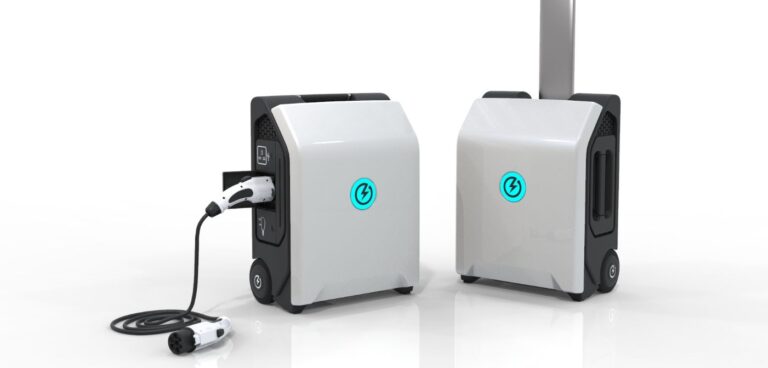ZipCharge has revealed its first portable EV charger at COP26 today [03 November], which is designed to tackle the off-street parking problem.
The Go is the first element of a global portable EV charging platform that combines hardware, software, machine learning and new ownership models to bring affordable, practical EV charging to more people.
“One of the key barriers to wider uptake of EVs is charging anxiety; the inability to charge near or at home. ZipCharge removes that hurdle and in doing so, will democratise EV ownership,” said Jonathan Carrier, ZipCharge co-founder.
Additionally, Go creates an intelligent energy management platform that provides flexibility and resilience for the national power grid.
Engineered to the same standards as automotive electronics systems, the Go power bank is the size of a compact wheeled suitcase which can be charged at home or elsewhere using a standard domestic plug. The company added this can be done at a lower cost per kWh of electricity when compared to public charging.
Using the retractable handle, users then wheel it to wherever they’ve parked their EV and plug it into the charging port. The port locks the charging cable in, securing the charger with the vehicle. ZipCharge Go provides up to 20 miles of range in 30 mins.
ZipCharge Go can be used in all normal weather conditions similar to a normal fixed charge point.
A bi-directional AC-DC inverter enables two-way charging from the grid to the unit, and from the unit to the grid, so the power bank can be used to store cheap off-peak energy and feed it back into the grid at peak times. An integrated communications module supports OCPP compliant smart charging, over-the-air updates, remote diagnostics, and together with geo-fencing and tracking technology provides enhanced security and peace-of-mind.
Integrated 2G/4G connectivity enables users to remotely manage their Go charger via the ZipCharge mobile app to monitor the device and schedule charging events so the power pack is always ready for when they need it. Inbuilt artificial intelligence will enable ZipCharge to learn the users’ charging patterns and make schedule recommendations to optimise charging at off peak times, saving money and reducing the load on the grid.
Richie Sibal, co-founder of ZipCharge, added: “Our technical approach to engineering the Go as a lightweight, compact and safe charging solution, and then evolving that into an EV charging platform reflects our intention to combine the development of battery-based systems with the lowest future environmental impact possible.”
ZipCharge is expected to deliver the first models to customers in Q4 2022.





